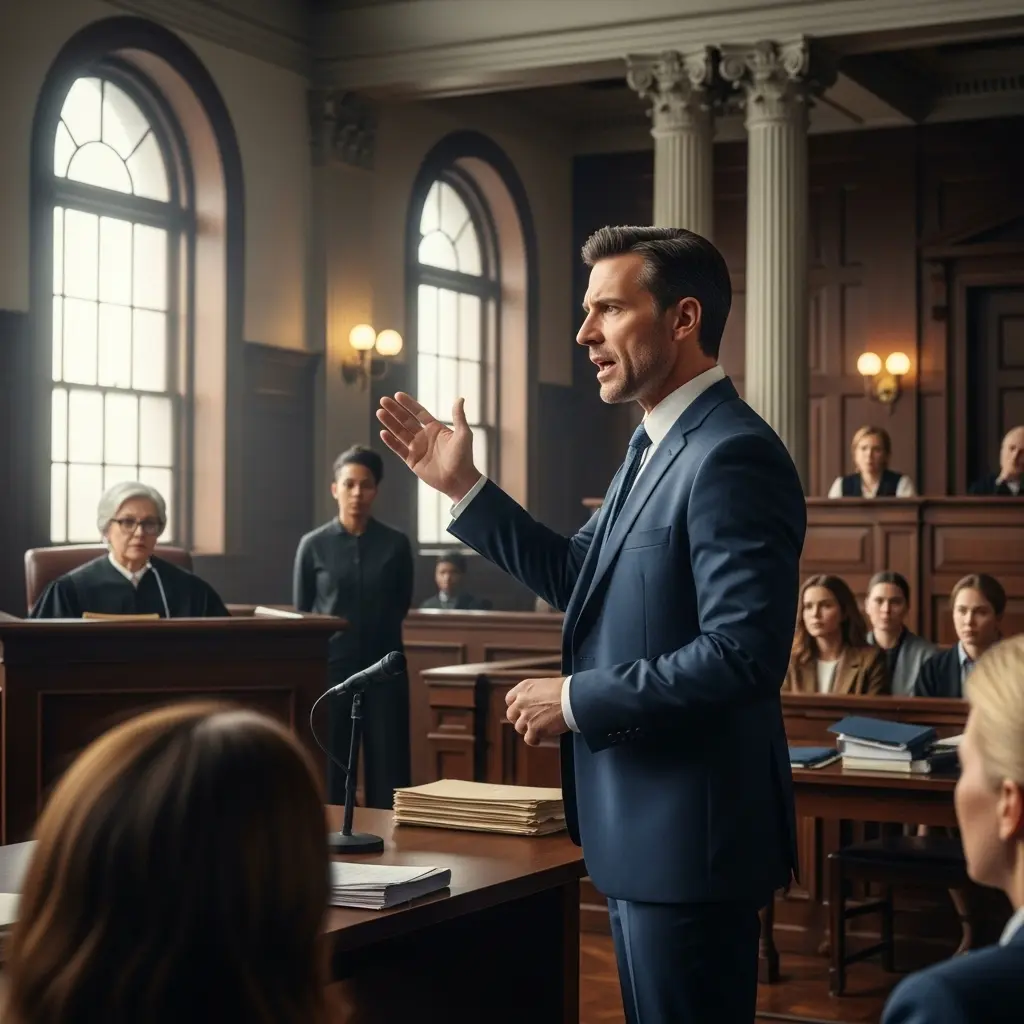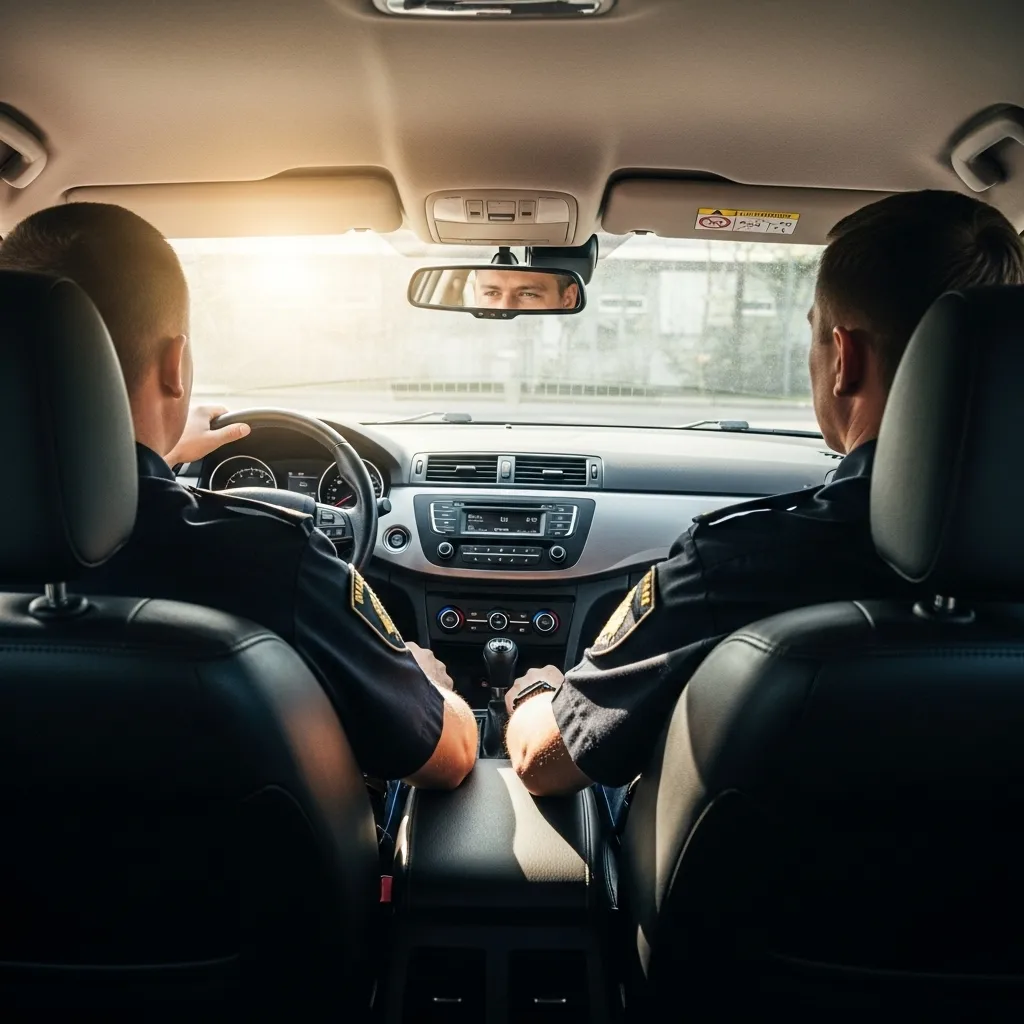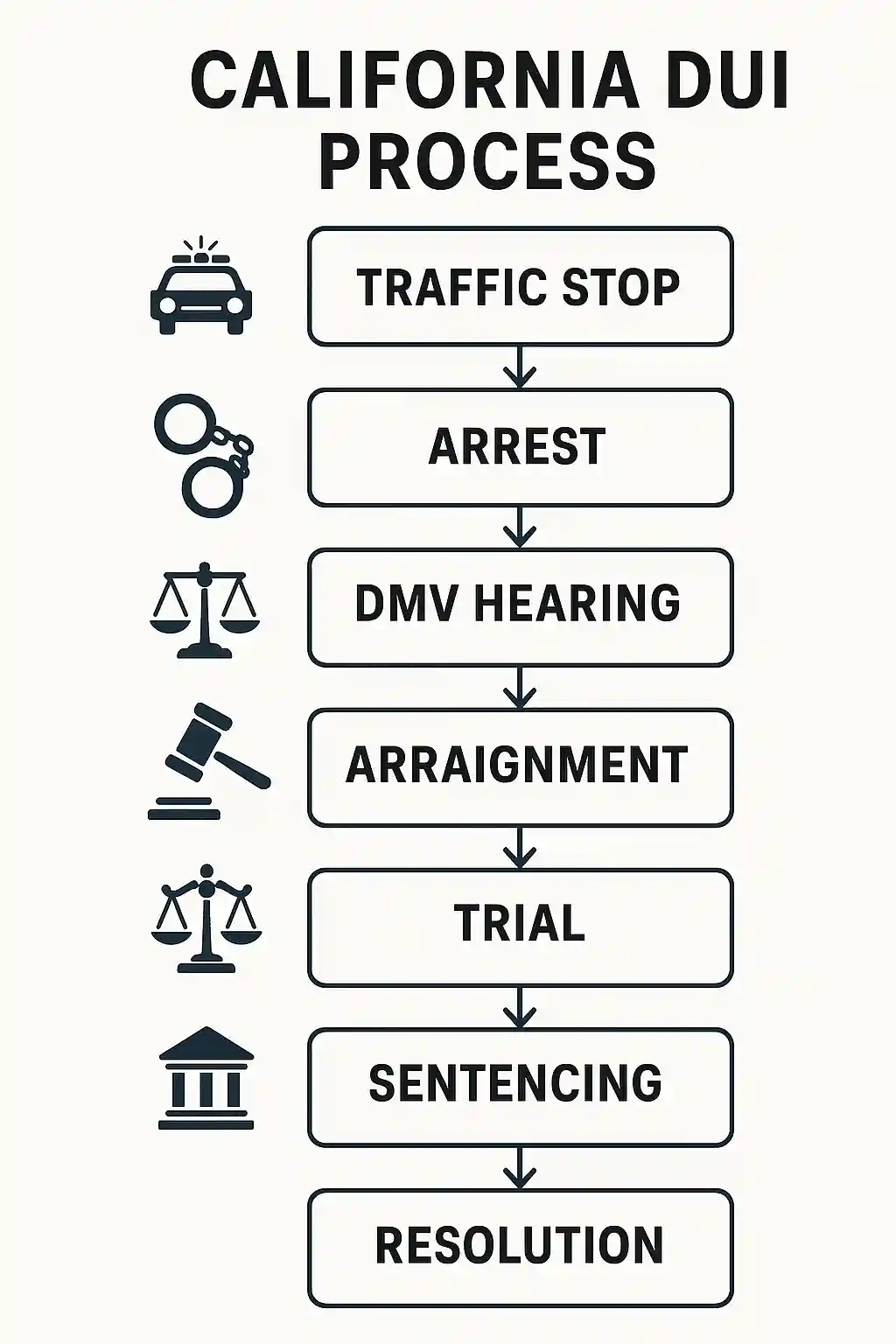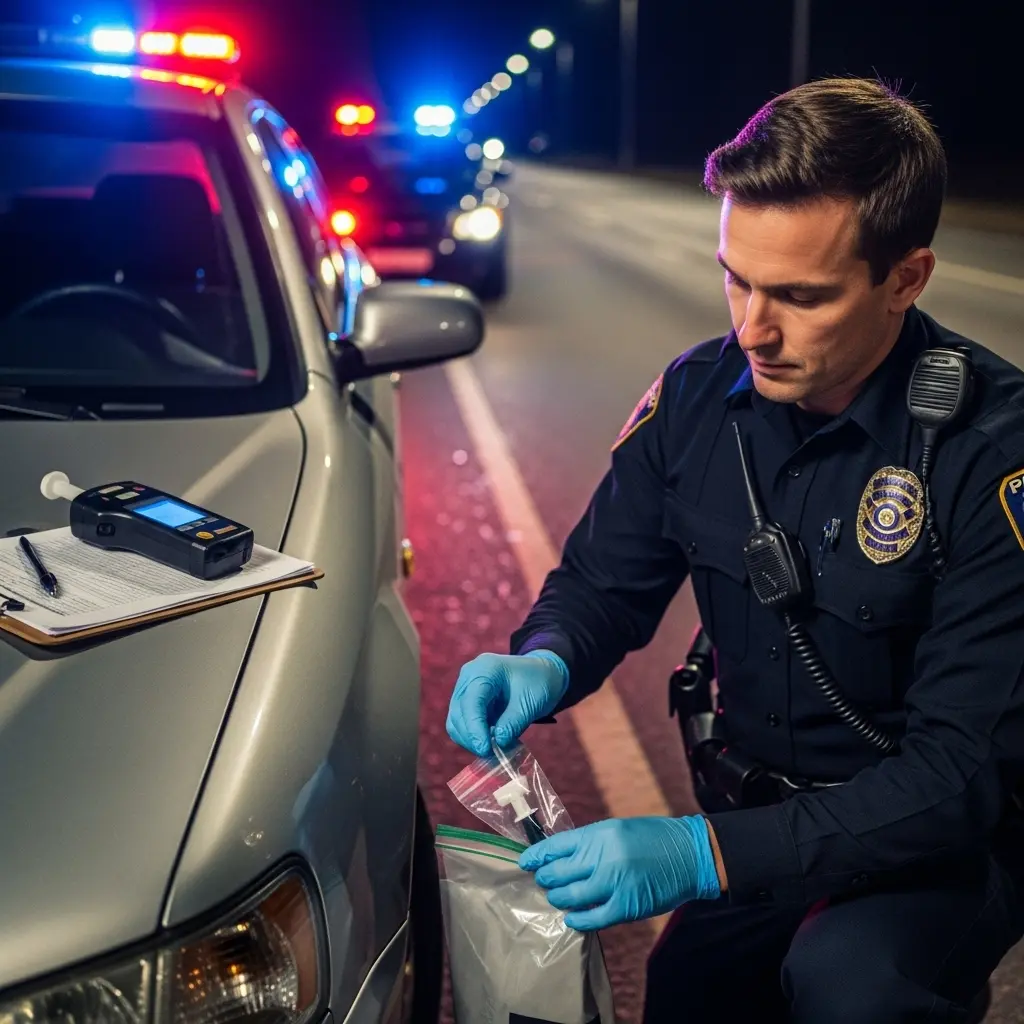

California continues to enforce some of the toughest DUI laws in the nation in 2025, with zero tolerance for impaired driving and an evolving legal landscape. Whether you're arrested for alcohol, prescription drugs, or marijuana impairment, navigating a DUI charge can be overwhelming—from field sobriety tests and chemical testing to DMV hearings and court appearances. This up-to-date, comprehensive legal guide explains everything you need to know about DUI laws in California, including license suspensions, SR-22 insurance, penalties, expungement eligibility, CDL consequences, and defense options. If you’ve been charged, understanding your rights and the legal process is critical. For immediate help, speak to one of the top DUI lawyers in Los Angeles—call +1 888-499-4948 for a free consultation.
To obtain a restricted license in California after a DUI-related license suspension, you must complete a 4-step process: serve a 30-day hard suspension with no driving, obtain an SR-22 Form, enroll in a DUI school, and pay a $125.00 fee to the DMV. A restricted license allows you to drive in very limited situations, including going to and from work and going to and from DUI school.
Eligibility Requirements:
Disqualifying Factors:
You may be ineligible for a restricted license if you were driving on a suspended/revoked license when stopped for DUI, or you refused to take a chemical test after being arrested for DUI. Multiple DUI offenders are not eligible for a restricted license that allows for work-related driving but are eligible only to drive with an ignition interlock device installed for twelve months.
In California, you can be charged with driving under the influence if you operate a motor vehicle after using any drug that causes impairment, even sleeping medications like Ambien. If you are accused of a DUI involving Ambien, you may be prosecuted under Vehicle Code Section 21352(f) for driving under the influence of drugs or Vehicle Code Section 21352(g) for driving under the influence of alcohol and drugs.
Classification and Penalties:
These charges may be treated as misdemeanors or felonies in California. Generally, DUIs are handled as misdemeanors, unless you have three previous misdemeanor DUI convictions, have one previous felony DUI conviction, or injured or killed someone in a DUI accident.
Prescription Drug Considerations:
Unfortunately, driving while taking some prescription medication could immediately result in a DUI charge. Oklahoma law treats impaired driving—whether from alcohol, illegal drugs, or prescription medication - the same. Even having a valid prescription does not protect you from DUI charges if the medication impairs your ability to drive safely.
Traffic violations in California are generally categorized into three types: infractions, misdemeanors, and felonies. Infractions are the most common type of traffic violation and usually result in a fine rather than jail time, including speeding and equipment violations.
Criminal Traffic Violations:
Misdemeanor traffic violations are more serious and can result in higher fines, points on your driving record, and possible jail time. Examples include reckless driving, driving under the influence of alcohol or drugs (DUI), and hit and run. These violations are not handled by Traffic court but are heard in Criminal Courts .
Penalty Structure:
Misdemeanor offenses are typically punishable by up to a year in jail, by a fine not exceeding $1,000 (plus assessment and fees), or both. Felony traffic violations are the most severe and can result in significant fines, long-term imprisonment, and a permanent criminal record.
Following a DUI conviction in California, one of the key steps to reinstate your driving privileges is obtaining SR-22 insurance. SR-22 insurance is not a type of insurance policy but rather a certificate of financial responsibility filed by your insurance company with the California DMV to confirm that you have the minimum required liability insurance coverage.
SR-22 Filing Process in California:
Requirements and Duration:
In California, drivers are generally required to maintain SR-22 insurance for three years following a DUI conviction. High-risk drivers may need an SR-22 certificate to restore their driving privileges after a DUI, reckless driving, or driving without insurance. The minimum liability requirements are $30,000 for bodily injury per person, $60,000 for bodily injury per accident, and $15,000 for property damage.

If you have been convicted of a DUI based on a judge's or jury's ruling after pleading not guilty, you have the ability to appeal your conviction if there was an error in your case. Although first-time DUI convictions generally do not carry lengthy jail sentences, the consequences can haunt you for years through increased insurance rates, loss of driving privileges, and damage to your personal and professional reputation.
Grounds for Appeal:
Your DUI appeals attorney will examine the trial record looking for appealable grounds such as incorrect evidentiary rulings, juror misconduct, insufficiency of evidence, improper jury selection, and improper jury instructions. Evidence may only be used against you if it was validly authenticated and the police used constitutional means to gather it.
Appeal Process:
When an appellate court hears your appeal, they will not be giving you a second trial but rather will want to hear your arguments for why you believe that your initial trial was unfair such that it justifies overturning your conviction.

In California, swerving can be a probable cause for a pullover, but the swerving needs to be significant enough to suggest that the driver is impaired or distracted. Probable cause is a legal standard that requires police officers to have a reasonable belief that a crime has been or is being committed.
Swerving Standards:
If a police officer observes a driver swerving once or twice, it may not be enough to justify a pullover. However, if the swerving is frequent and significant, the officer may have probable cause to pull the driver over and investigate further. The most important condition is that the swerving needs to be significant enough to suggest that the driver is impaired or distracted.
Additional Justifications:
Other common reasons for traffic stops include speeding, illegal turns, failure to obey traffic control devices, equipment violations, and other observed traffic violations.
A "critical needs license” is not limited to those under 21 years of age and can be issued upon a demonstrated need to drive for education, medical services, or employment, but only when reasonable alternatives for transportation are unavailable, impractical, or too expensive.
Eligibility for Under-21 Drivers:
In California, anyone under 21 years old who has been found to have been driving with a .01% or more of alcohol in their blood will have their driver's license suspended for at least a year under Zero Tolerance laws. After a 30-day suspension period, you may apply for a critical need DL only if you completed a PAS or chemical test with a BAC level of 0.01% or more and you have a critical need to drive.
Application Process:
You must complete the DS 694 application form titled "Application for Critical Need Restriction". You must check one or more reasons you need a restricted hardship license, including "For Family Illness," "To and From School," "To and From Work," and "For Family Enterprise". Most critical need applications are denied, as the DMV considers these licenses to be severely limited and only granted in extreme need where all other transportation is inadequate.
California provides the opportunity for individuals with a DUI conviction to seek expungement under certain circumstances. To be eligible, the individual must have successfully completed probation and met all the requirements set by the court, including completing mandatory DUI classes, paying fines, and adhering to other probationary conditions.
DUI Expungement Steps in California:
Benefits:
Some benefits of erasing your DUI criminal record include the option to privacy and not needing to reveal your criminal record to potential employers, increased eligibility for professional licenses, and easier changes to immigrant status.

A Commercial Driver's License (CDL) is required for operating large or specialized vehicles, and CDL holders are subject to stricter legal standards compared to regular drivers. California enforces significant penalties for CDL holders convicted of a DUI, whether the offense occurs in a personal or commercial vehicle.
BAC Limits:
Zero-Tolerance Policies:
California enforces strict DUI penalties for CDL holders who operate a commercial vehicle with any detectable alcohol in their system, even if their BAC is below 0.04%. Consequences include an out-of-service order for 24 hours and potential CDL disqualification.
In California, you have the right to refuse to perform field sobriety tests, and doing so is not an admission of guilt. However, refusing a field sobriety test may have certain consequences and legal implications.
Types of Field Sobriety Tests:
Field sobriety tests are a set of physical and cognitive tasks designed to evaluate a driver's coordination, balance, and mental clarity. Common tests include the horizontal gaze nystagmus (HGN), walk-and-turn (WAT), and one-leg stand (OLS) tests.
Implied Consent Distinction:
It is important to note that implied consent law specifically applies to chemical tests and not to field sobriety tests. Implied consent does not apply to the roadside field sobriety tests, which are optional. The breath test (typically at the station) or blood test is what falls under implied consent requirements.
A DUI conviction can have serious ramifications for your employment and career prospects, both in the short and long term. California is an "at-will" employment state, so unless the situation involves a job contract that states otherwise, employers may fire current employees at any time for any reason, including a DUI conviction.
Employment Consequences:
California's "Ban the Box" Law:
Employers cannot ask about criminal history on job applications, and a background check can only be conducted after a conditional job offer is made. If a DUI is found on your record, the employer must provide an opportunity to explain the circumstances before revoking the offer.
In a drug DUI case, the prosecutor must prove that the defendant was operating a vehicle while under the influence of drugs and that the defendant's ability to operate a vehicle was impaired by the presence of drugs. Unlike alcohol, there is no specific legal limit for drug impairment, making it more challenging to determine the extent of impairment caused by drugs.
Evidence Types:
Challenges in Prosecution:
When it comes to DUI charges, a drug DUI is often more challenging for the prosecutor to prove compared to an alcohol DUI. Some substances can remain detectable in the body for an extended period, making it difficult to establish impairment at the time of driving.
If arrested for DUI, you likely received a pink notice entitled "Notice of Suspension". You must request a hearing within 10 calendar days from the date of your arrest. The California DMV will automatically suspend your driving privileges if you do not make a hearing request within this time period.
Contact Information:
You must contact a Driver Safety office of the Department of Motor Vehicles (DMV) to request a DMV administrative hearing (also referred to as an "administrative per se (APS) hearing"). Key offices include:
Required Information:
The office typically asks you to identify yourself by providing your full name, driver's license number, and date of arrest.
DUI laws vary significantly across different states in terms of penalties, procedures, and enforcement. The legal limit for blood alcohol concentration (BAC) is generally 0.08% for adults, but this can vary depending on the driver's age and the type of vehicle they are operating.
State-Specific Examples:
Common Variations:
States differ in their penalties for repeat offenders, ignition interlock device requirements, and zero-tolerance policies for underage drinking and driving.
In California, a second DUI conviction is subject to more severe penalties than a first DUI offense. Vehicle Code Section 23540 specifically dictates the minimum and maximum penalties when a second DUI offense occurs within ten years of a prior DUI conviction.
Penalty Progression:
Enhanced Requirements:
A second DUI conviction requires completion of a longer and more intensive DUI education program compared to first-time offenders. The individual may apply for a restricted license, but this requires the installation of an ignition interlock device.

The evidence-gathering process for a DUI case begins the moment a law enforcement officer initiates a stop. Police officers are trained to observe specific signs that may indicate impairment, including erratic driving behavior, vehicle equipment issues, and failure to follow traffic laws.
Evidence Collection Methods:
Observation Evidence:
If an officer observes erratic driving behavior such as swerving between lanes, failing to signal, or driving too slowly, this may establish probable cause to pull the driver over and investigate further.
Avoiding jail time is possible in many cases, depending on the circumstances and which DUI defense strategies are employed. Since 1985, experienced DUI attorneys have helped numerous clients avoid jail time and minimize other consequences of DUI arrests.
Jail Sentence Guidelines:
Alternatives to Jail Time:
If you are convicted of a second or multiple DUI within 10 years in California, the only way to avoid jail time is to arrange some type of sentencing alternative, such as mandatory AA meetings, screenings, and alcohol classes. Other alternatives may include community service and electronic monitoring.
Aggravating Circumstances:
Certain circumstances can add to the amount of jail time you may face, such as a DUI accident, blood alcohol content (BAC) level of .20 or higher, refusal to submit to a chemical test, or driving more than 20 MPH over the speed limit.

An ignition interlock device (IID), sometimes called a car breathalyzer, is a small device installed in your car that prevents you from driving if you've been drinking. Smart Start will install an Interlock Device into your work vehicle so you can comply with your court or state orders.
Work Vehicle Installation:
All Smart Start needs is your company's written permission, either on their letterhead or their state-specific form. If the vehicle is not registered under your name, you will need an 'Ignition Interlock Consent to Install' form completed by the registered owner. If the vehicle is leased, you must take a letter on company letterhead authorizing Smart Start to install the device.
How a IID or Car Breathalyzer Works:
Before starting your car, you blow into the device to check your Breath Alcohol Content (BrAC). If your BrAC is below the legal limit (usually 0.02), your car will start. While driving, the IID will request random breath samples to ensure you remain sober throughout the trip.
Penalties differ in proportion with the offense. The length of the administrative suspension depends on your circumstances and the specific offense.
Administrative Suspension Periods:
Refusal Suspensions:
For drivers who refuse to take the breath, blood, or urine test after a DUI arrest:
Conviction-Based Suspensions:
Mental health diversion is a pretrial program in California that lets you seek mental health treatment instead of jail. California Senate Bill 215 (SB215) became effective on June 27, 2018, allowing people with certain mental illnesses to go into a pretrial diversion program, receive treatment, and ultimately erase the charges against them.
Covered Mental Illnesses:
This law covers most mental illnesses, including bipolar disorder, depression, PTSD, and schizophrenia. The only mental illnesses not covered are antisocial personality disorder, borderline personality disorder, and pedophilia.
Program Benefits:
If your mental health treatment is ultimately deemed successful after up to two years in the diversion program, all charges will be dropped. If you successfully complete all requirements, the charges against you will be dropped and your arrest record will be sealed as though the arrest never happened.

California's open container law, as outlined in Vehicle Code Sections 23221-23229, prohibits individuals from drinking alcohol or possessing open containers of alcoholic beverages while driving or riding as a passenger in a motor vehicle. The law defines an open container as any bottle, can, or other receptacle containing an alcoholic beverage that someone has opened, had its seal broken, or had some of its contents removed.
Specific Provisions:
The law applies to drivers and passengers, ensuring everyone in the vehicle is held accountable for their actions.
Public intoxication is a California crime when you are drunk or high in a public place to the point of being unable to care for your safety or that of others. California Penal Code § 647(f) PC sets forth the crime of public intoxication, also called drunk in public.
Elements of the Crime:
To be guilty of public intoxication under California Penal Code § 647(f), you must be under the influence of a controlled substance in a public place AND be unable to exercise care for yourself or others OR obstruct the free use of public streets/walkways.
Penalties:
Public intoxication is a misdemeanor crime punishable by up to six months in county jail if convicted, or a fine of up to $1,000, or both a fine and imprisonment. The statute requires that the accused individual willingly took the substance.
Reasonable suspicion for traffic stops requires that law enforcement officers have specific, articulable facts that suggest the possibility of criminal activity. These facts must be pertinent and directly related to the circumstances surrounding the stop. The standard for reasonable suspicion is less stringent than the criteria needed to establish probable cause.
Common Indicators:
Legal Standard:
For police officers to make a traffic stop, they must first establish reasonable suspicion, which is essentially a presumption that a crime is being, has been, or will be committed based on specific circumstances and facts. Simply having a hunch or gut feeling doesn't give rise to reasonable suspicion.
In California, most felony DUI reductions happen under Penal Code 17(b), which allows a judge to reclassify certain felonies as misdemeanors. A DUI becomes a felony when it's your fourth DUI offense within 10 years, the DUI caused injury or death to another person, you have a prior felony DUI conviction, or you're already on probation for a felony DUI.
Eligibility for Reduction:
In many cases a felony DUI can be reduced to a misdemeanor if you have the right legal strategy and an experienced defense attorney. The reduction is possible depending on the nature of the charge and the circumstances surrounding the case.
Benefits of Reduction:
A misdemeanor conviction is generally regarded as less severe than a felony, with typically shorter license suspensions, lower fines, and fewer long-term legal implications. A misdemeanor also has less impact on auto insurance rates compared to a felony conviction.
Under California's implied consent laws, any driver who is lawfully arrested on suspicion of DUI is required to submit to chemical testing when requested by a law enforcement officer. A driver who refuses testing will face a yearlong driver's license suspension and can still be charged with DUI along with a refusal allegation.
Refusal Requirements:
Before a DUI arrest will be deemed a refusal, law enforcement must follow certain requirements. The driver must be read a refusal admonishment informing them of their obligation to submit to chemical testing and the consequences of refusal. The officer must also inform the driver of testing options and give them a chance to refuse each approved form of testing.
Do's and Don'ts:
When a person is arrested for DUI, they are often asked to blow into a breathalyzer machine multiple times before getting an accurate reading. One reason an officer may ask for multiple breathalyzer tests is to ensure the accuracy of the results. The breathalyzer machine can produce inaccurate results if the person does not blow into it properly or if the machine is not calibrated correctly.
Multiple Test Justifications:
Legal Authority:
Yes, there is no limit as to the number of times, especially if officers believe the person is trying to cheat the machine by not fully blowing into it or not making a tight seal. The police officer, in an attempt to get an accurate reading, can request multiple samples.
Expert witnesses are crucial components in the defense strategy of DUI cases in California. They bring specialized knowledge that can help challenge the prosecution's evidence and support the defense's arguments.
Types of Expert Witnesses:
Contributions to Defense:
Expert witnesses provide testimony and analysis in several critical areas that can significantly impact a DUI case, particularly in challenging blood alcohol concentration (BAC) results.
Probation is a common sentencing option for individuals convicted of driving under the influence (DUI) in California. Instead of serving time in jail, offenders are placed under the supervision of a probation officer, with specific conditions they must follow. Probation allows individuals to avoid incarceration, which can disrupt their personal and professional lives.
Types of Probation:
California DUI probation is typically offered for first-time offenders or those convicted of less severe DUI offenses. Probation may be either informal (unsupervised) or formal (supervised), depending on the severity of the case.
Common Conditions:
Vehicles may be held as evidence in various legal matters, including criminal investigations, accidents, or civil disputes. Common reasons include criminal investigations where vehicles are suspected of being involved in activities such as drug trafficking, theft, or hit-and-run accidents.
Procedures:
When a vehicle is held as evidence, law enforcement typically follows specific procedures: impoundment in a secure facility, documentation of the vehicle's condition with photographs, and forensic examinations if necessary. The owner is typically notified of the impoundment and provided with information on how to reclaim the vehicle.
According to California Vehicle Code 22651(h), if a police officer arrests a person driving or in control of a vehicle for an alleged offense like DUI and takes them into custody, they are legally permitted to remove the vehicle and have it impounded. California state law also allows a judge to have your car impounded after you are convicted of a DUI as part of sentencing.
Impoundment Duration:
After a second or third DUI conviction within 10 years, your car could be impounded for up to 30 or 90 days, respectively. The good news is that there is no law stating that your vehicle must be impounded after an arrest for a DUI, as police officers generally have discretion.
A "Watson advisement" is a formal statement you must sign after being convicted of DUI. It says you understand that driving under the influence can injure or kill people, and it can be used against you if you ever cause a DUI accident in the future.
Legal Significance:
The purpose of the Watson advisement is to create a legal record that you are aware of the dangers that DUI poses not only to yourself but to others. If you are ever involved in another DUI in the future, and that DUI leads to an accident that injures or kills someone, you cannot claim that you didn't understand the consequences. Legally, this means that you could be tried for second-degree murder if your DUI kills someone.
Origin:
The Watson advisement started with a California Supreme Court case, People v. Watson in 1981. In that case, the court found that an impaired driver can be held accountable for murder even if they didn't set out planning to crash and kill someone.

Street racing is considered illegal in California and is defined as an exhibition of speed between two or more vehicles on a public roadway. Under California law, street racing is defined as "an exhibition of speed or acceleration, by two or more motor vehicles, either on a public highway or a street or a private road". California Vehicle Code 23109(a) makes it illegal to engage in any exhibition of speed on a public roadway, highway, or street.
Penalties:
If convicted, the first-time offender may be charged with a misdemeanor and face up to 90 days in jail, fines of up to $1,000, or both. The second-time offender may face up to six months in jail, fines of up to $1,000, or both, with the offender's driver's license potentially suspended for up to six months. Third or subsequent offenders may face up to one year in jail, fines of up to $1,000, or both.
Long-term Consequences:
A conviction for street racing can result in a criminal record, which can impact the ability to secure a job, rent a home, or obtain a loan. It can also cause car insurance rates to increase.
Choosing a "no-contest" plea means you won't contest the charges but also won't admit guilt. The outcome is the same as a guilty plea—you'll be convicted and face the same California DUI penalties. In a DUI case, pleading no contest means that the defendant does not challenge the charge of driving under the influence.
Legal Implications:
A no contest plea (also called nolo contendere) is a formal declaration made in court in which a defendant neither admits guilt nor contests the charge against them. Essentially, the defendant acknowledges that the prosecution has enough evidence to secure a conviction but does not admit to having committed the crime.
Benefits:
One of the primary benefits of a no contest plea is that it cannot be used as an admission of guilt in any civil lawsuit. If a defendant is involved in a DUI accident that causes injury or damage to property, a civil lawsuit could be filed by the victim. If the defendant pleads guilty, that plea can be used as evidence in a civil case, but if they plead no contest, it cannot.
The DMV gives you ten days after receiving a discretionary action notice to request a hearing. If the notice was mailed, you have 14 days to request a hearing. These timeframes are strictly enforced, and failure to request a hearing within the allotted time can result in the DMV denying your hearing request.
Consequences of Late Requests:
If you do not request a hearing on time, you lose the opportunity to challenge the discretionary action taken against your driving privileges. This can have serious consequences, such as losing your license or having your driving privileges restricted.
Exceptions:
Occasionally, a DMV hearing request can be accepted late if there is a good argument as to why it has been requested outside of the provided time frame. A valid reason could include a medical emergency or other circumstances beyond your control that prevented you from requesting the hearing within the specified timeframe. Another exception is when the DMV did not provide proper notice of the discretionary action.
Alternative Deadlines:
The Vehicle Code provides both a 10-day and a 30-day deadline for requesting a DMV hearing. If you miss the 10-day deadline but meet the 30-day deadline, it may be worth retaining a lawyer to preserve your hearing rights.
Reckless driving in California means driving with willful or wanton disregard for the safety of people or property, as defined under California Vehicle Code § 23103. This includes driving on public roads or in parking areas in a way that shows clear indifference to safety.
Definition and Standards:
Though "reckless driving" is a relatively broad term, California law defines a reckless driver as a "person who drives a vehicle upon a highway in willful or wanton disregard for the safety of persons or property". The phrase "willful and wanton" generally means that the driver behaved intentionally and with the knowledge that the behavior would likely result in harm.
Vehicle Code § 21658 CVC is the California statute that makes it a crime to weave inside a traffic lane or to straddle a marked line. Straddling a line means driving over a marked line as opposed to driving in between two marked lines. A violation of this law is an infraction, and you will receive a ticket and one point on your driving record.
Penalties:
Weaving and lane straddling are charged as infractions in California, punishable by a ticket and a fine, and one point on your DMV driving record. If you accrue enough points within a 1-, 2- or 3-year period, the Department can declare you a negligent operator and suspend or revoke your driving privileges.
The DMV hearing deals with the circumstances of your arrest and your driving privileges, while a court hearing will decide if you are guilty or not guilty. The DMV hearing is optional, while a court hearing is mandatory.
Key Differences:
Independence:
The terrible thing about a DUI is that the court and DMV have separate and independent powers over your driver's license. Even if charges are dropped or reduced in court, the DMV can still suspend or revoke your license. You only have a limited time to request a DMV hearing to challenge their decision.
In California, aggravated DUI charges involve additional factors, known as "aggravating circumstances," which make the offense more serious. These are known as enhancements, and state law says a DUI is more serious and may carry harsher penalties when any enhancement is present.
Common Enhancements:
Enhanced Penalties:
The penalties for aggravated DUIs are much harsher, including longer jail time and higher fines. Aggravated DUI can carry additional penalties such as extra jail time, extra fines, and more severe consequences.
According to data from the Judicial Council of California, the initial expenses of a DUI can be upwards of approximately $5,435. This figure includes various elements such as fines, legal fees, court costs, and expenses related to mandatory educational programs. The cumulative expenses related to a DUI can reach a staggering $45,435.

Additional Costs:
These immediate costs can be a sudden financial burden, and understanding the potential costs associated with a DUI charge can help you plan your course of action more effectively.
A Wet Reckless conviction is essentially a reckless driving conviction with one crucial component: the involvement of alcohol. A conviction of a wet reckless is a much better outcome for a DUI case than a conviction of a DUI and is generally beneficial when it comes to background checks or employment.
Key Characteristics:
The term "wet" in wet reckless indicates the presence of alcohol in the scenario. It's crucial to understand that a wet reckless conviction signifies that the driver was operating the vehicle recklessly. To the public, this will show as reckless driving on records, but the difference between wet reckless and reckless driving is that a wet reckless is priorable if another DUI were to happen within 10 years.
Differences from DUI:

In California, driving under the influence of alcohol or drugs can be charged as a felony in only four situations: it is your 4th DUI within 10 years, you have a prior felony DUI conviction, you cause an accident in which another person is physically injured, or you cause a fatal accident.
Felony DUI Categories:
Penalties:
All felony DUI offenses in California are potentially probationable except Watson murder. Penalties include 16 months to 3 years in county jail and up to $10,000 in fines, plus ignition interlock requirements, license suspension, loss of gun rights, and inability to vote while in prison or on parole.
DMV hearings are conducted by hearing officers who are employed by the DMV's Driver Safety Offices. The Driver's Safety Office (DSO) is a state agency responsible for conducting DMV hearings, and the hearing itself is conducted by a hearing officer who is an employee of the DSO.
Role of Hearing Officers:
The hearing officer is not an attorney or judge, but rather an administrative official who has been trained in DMV hearing procedures. The hearing officer's role is to listen to the evidence presented and make a determination based on the facts of the case. They are responsible for ensuring that all parties have an opportunity to present their case and that all evidence is considered.
Key Differences:
The hearing officer is not required to have a legal background, which is a significant difference between a DMV hearing officer and a judge or attorney. While the hearing officer has knowledge of the DMV's rules and regulations, they may not have the same level of understanding of the law as an attorney or judge would.
Field-sobriety tests in California are voluntary, and you may politely decline them because they are subjective and often affected by medical or environmental factors — learn more in the our guide “Field Sobriety Tests: Know Your Rights”.
Drivers can refuse a PAS device during a roadside investigation, but refusal of the post-arrest chemical test triggers a one-year license suspension under the implied-consent law, as explained in “Refusal? The Do’s and Don’ts of a DUI” and the related PAS primer “What is the PAS Test?”.
You have only ten calendar day to demand an administrative per-se hearing, a deadline detailed in “How Do You Request a DMV Hearing After a DUI?” .
A late request usually forfeits your right to challenge the suspension, although the DMV may accept a late filing for good cause, as described in “What Happens If I Request My DMV Hearing Late?”.
The hearing is run by a Driver Safety Office hearing officer — a licensed DMV employee rather than a judge — as outlined in “Who Conducts a DMV Hearing?”.
Skilled counsel can negotiate alternatives such as treatment, electronic monitoring or plea reductions, as discussed in “How To Avoid Jail Time For A DUI”.
Yes — any observable impairment can trigger a Vehicle Code § 23152(a) charge even under the per-se limit, as explained in “DUI Under Legal Limit”.